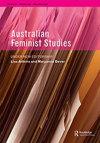Gathering Stories of Belonging: Honouring the Moʻolelo and Ancestors that Refuse to Forget Us
IF 1.5
4区 社会学
Q2 WOMENS STUDIES
引用次数: 2
Abstract
ABSTRACT For too long Indigenous queers have been forced to quiet our pleasure and intimacy to be digestible to our communities. As more Indigenous queer scholars have begun to interrogate and move in conversation between Native studies and queer and feminist theory, Indigenous queers and feminists are carefully articulating a necessary shift in approach and perspective when unpacking the erasures and displacemennt of intimacy and desire under the tyranny of cis-heteropatriarchy, settler colonialism, and occupation. In the case of Kanaka Maoli (Native Hawaiian) theories of intimacy can only emerge from the specific lessons our ʻāina (land, that which feeds) has taught us about how to practice an aloha (love, pleasure, and intimacy) that is just, generative, and deeply satisfying. Therefore, this article takes aloha and ʻāina seriously. And together as author and reader we explore the way kaona (Hawaiian literary techniques) demonstrate a deeply profound relationship between our ʻāina and the ways our kūpuna practice intimacy, pleasure, and consent with each other. These moʻolelo call us all to remember that if ʻāina and our relationship to her is our greatest model of intimacy then reestablishing an intimate connection to her and to each other are our most promising pathways towards decolonisation.收集归属的故事:纪念莫和拒绝忘记我们的祖先
摘要长期以来,土著酷儿们一直被迫让我们的快乐和亲密安静下来,以便我们的社区能够理解。随着越来越多的土著酷儿学者开始在土著研究与酷儿和女权主义理论之间进行审问和对话,土著酷儿和女权主义者在解开顺式异父权制、定居者殖民主义和占领的暴政下对亲密关系和欲望的抹去和置换时,正在仔细阐述方法和视角的必要转变。就卡纳卡·毛利(夏威夷原住民)而言,亲密关系理论只能从我们的土地(土地,食物)教给我们的关于如何实践一种公正、生成和深深满足的aloha(爱、快乐和亲密)的具体教训中产生。因此,本文认真对待阿罗哈和伊纳。作为作者和读者,我们一起探索kaona(夏威夷文学技巧)如何展示我们的夏威夷人与我们的kúpuna练习亲密、快乐和相互同意的方式之间的深刻关系。这些莫奥莱洛呼吁我们所有人记住,如果伊娜和我们与她的关系是我们最伟大的亲密模式,那么重建与她和彼此的亲密联系是我们实现非殖民化最有希望的途径。
本文章由计算机程序翻译,如有差异,请以英文原文为准。
求助全文
约1分钟内获得全文
求助全文
来源期刊

Australian Feminist Studies
WOMENS STUDIES-
CiteScore
2.50
自引率
0.00%
发文量
7
期刊介绍:
Australian Feminist Studies was launched in the summer of 1985 by the Research Centre for Women"s Studies at the University of Adelaide. During the subsequent two decades it has become a leading journal of feminist studies. As an international, peer-reviewed journal, Australian Feminist Studies is proud to sustain a clear political commitment to feminist teaching, research and scholarship. The journal publishes articles of the highest calibre from all around the world, that contribute to current developments and issues across a spectrum of feminisms.
 求助内容:
求助内容: 应助结果提醒方式:
应助结果提醒方式:


